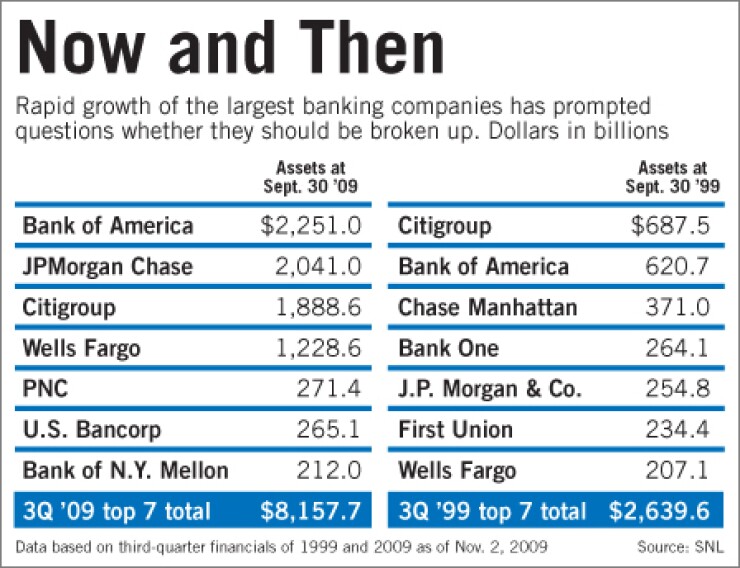-
As the politicians and regulators fret about how to handle big banks, it is worth asking whether we really even need them — big banks, that is.
November 4 -
The debate over "too big to fail" raises tough questions about the complexity of big banks — not just whether their breadth is worth preserving, but whether it is even capable of being managed.
November 5

First of three parts
The push to dismantle big U.S. banks gathered fresh momentum Tuesday as the British government forced the breakup of two institutions as a condition of their continued support by taxpayers.
Though it may be too early to declare Paul Volcker vindicated, the planned divestitures agreed to by Royal Bank of Scotland Group PLC and Lloyds Banking Group PLC provide a blueprint for downsizing bailed-out firms. And they make the European Union's recently announced breakup of ING Group NV look less like an isolated case and more like the start of a trend.
But it remains unclear how the U.S. government will approach institutions currently considered "too big to fail," and whether regulators actually are interested in ridding the system of firms deemed as such.
Even within the bust-'em-up camp there is a debate over whether the lines ought to be drawn on size or on scope. Volcker, the former Federal Reserve Board chairman, wants commercial banks out of the investment banking business, with rules resembling the old Glass-Steagall Act. Others, like Simon Johnson, the former International Monetary Fund chief economist, say it is the concentration of credit risk in any form, not the mixing of lending and trading, that makes big banks a threat to the system.
Two weeks ago, neither view appeared to be getting much traction in Washington. Volcker, who heads President Obama's Economic Recovery Advisory Board, reportedly had been sidelined on policy matters as others in the administration asserted a more charitable view of full-service banks. And advice from the likes of Johnson, now a professor at the Massachusetts Institute of Technology's Sloan School of Management, seemed to run counter to the crisis-time decisions of regulators, who in arranging rescues of troubled banks effectively increased the size of companies already considered "too big to fail."
But the winds have shifted. In what is sure to be seen as a landmark speech on the topic, Mervyn King, head of the Bank of England, told a group of Scottish business leaders on Oct. 20 that there are only two logical ways of solving the problem posed by big banks: either accept that some institutions are "too big to fail," and apply regulatory discipline to make their failures less likely; or figure out how to resolve big-bank failures at minimal cost to society. He left little doubt as to his preference.
"There are those who claim" that proposals to restrict government guarantees for utility banking firms "are impractical," King said. "It is hard to see why. … What does seem impractical, however, are the current arrangements."
In a letter to The New York Times that same week, former Citicorp Chairman John S. Reed, responding to an article about the apparent marginalization of Volcker's voice within the Obama administration, said he agreed with Volcker that "some kind of separation" between commercial banking and capital markets activities "makes sense."
Revealingly, the crisis had convinced Reed that big lenders, including the one he led into a watershed merger with Sandy Weill's Travelers Group in 1998 to form Citigroup Inc., should get out of investment banking.
Together, the voices of industry statesmen like King, Volcker and Reed form a chorus urging a reconsideration of the issues around big banks.
"Two weeks ago I would have said it's very unlikely" that the government would seek the breakup of large institutions, said Robert Bruner, dean of the University of Virginia's Darden School of Business. "But in the wake of these speeches and utterances by very prominent people, I've grown aware that this is a topic of discussion among serious people, and that to me would be an indication that the probability is higher than perhaps ever before."
The news from Europe may further recast the debate, just by illustrating what is possible were regulators to decide that the system would be safer with smaller firms.
Dispensing with concerns over whether genies can be put back into bottles, European regulators simply imposed their will to deconstruct some of the Continent's biggest and most complex firms. ING now plans to sell its insurance business and the American piece of its ING Direct online banking unit. RBS will sell more than 300 U.K. bank branches, along with its insurance and global merchant services division and its stake in a commodities trading business, while Lloyds will shed 600 branches and slash mortgage assets. The British firms also agreed to new compensation limits as they accepted a new helping of aid.
The powerful U.S. financial lobby so far has been effective in protecting big banks, even amid a backlash over industry pay and bailout costs. But the rising tide promises to reshape the fight over policy, philosophy and the strategic imperatives that will define the future of banking.





